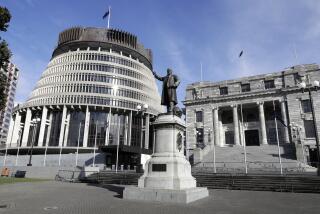U.S. Acquiesced in China Spying, Record Shows
WASHINGTON — Ten years ago, worried about spying by Chinese officials in the United States, the FBI urged the State Department to classify China as a nation with a “hostile intelligence service,” subject to the same restrictions as the Soviet Union and its Eastern European allies.
But the request was turned down. To label China in this way, a State Department official explained at the time, “doesn’t seem to us to go along with our overall relations.” Instead, the U.S. government continued to characterize China as what it formally called a “friendly, nonaligned country.”
This episode--which took place in Washington at roughly the same time China’s intelligence service was targeting American nuclear secrets in Los Alamos, N.M.--illustrates the underlying dynamics of America’s approach to Chinese espionage over the last two decades.
The record shows that the People’s Republic of China has been spying on the United States at least since the time of the Korean War, when Larry Wu-Tai Chin, the most notorious Chinese agent of them all, began working as a CIA translator.
The United States, of course, has been spying on China too.
“Nations will do that to each other and have done so for centuries,” Bob Suettinger, a recently retired CIA official, said last week. Commenting on the current furor over Chinese spying at the Los Alamos National Laboratory, Suettinger quipped: “Someone with my background could hardly pretend to be shocked.”
Both Sides Made Arrests Quietly
But starting in the early 1970s, when the Nixon administration began quietly sharing intelligence with China to help offset Soviet military power, American concerns about Chinese spying were muted, largely because of the need to preserve Beijing’s cooperation in the Cold War.
“What we always did was to arrest their guys quietly, because they always arrested our guys quietly,” recalled Douglas Paal, who worked on China policy for the Reagan and Bush administrations.
Within the U.S. government, the FBI--the agency responsible for detecting spying by foreign governments--regularly has warned about Chinese spying but sometimes has lost out in its efforts to prevent it.
Over the years, Los Angeles and the surrounding areas of Southern California have figured prominently in these internal bureaucratic battles over how to combat Chinese espionage.
The FBI has argued that Chinese spying activities are aimed at stealing American technology and that Southern California, because of its high-tech and aerospace industries, is a particular target.
When the Chinese government in the mid-1980s sought permission to open a consulate in Los Angeles, the FBI balked at the idea, pointing out that it would make it easier for China to spy. But the Reagan administration finally approved the proposal in exchange for the right to open an additional American consulate in China.
Chinese, Soviet Spying Compared
Still, the FBI warnings continued.
In 1987, James H. Geer, then the FBI’s assistant director for intelligence, cautioned in a speech that Chinese agents in the United States had come to pose nearly as great a problem for U.S. counterintelligence as agents from what was then the Soviet Bloc.
Geer explained the difference between Chinese and Soviet spying with a humorous analogy.
“If a grain of sand were a piece of information, the Soviets would bring a submarine offshore in the dead of the night and send a dinghy with men in it dressed in dark wetsuits who would fill a bucket of sand and go back to the submarine and steal away in the dead of the night,” Geer said.
“The Chinese, on the other hand, would send 100,000 bathers to the beach in broad daylight and during the course of the day, each bather would pick up one grain of sand and bring it home with him. . . . That’s pretty much what’s happening.” That comparison embodied much
of the conventional wisdom that American officials have passed along to one another about Chinese spying: that it makes use of more people but has fewer super-agents than did Soviet espionage.
“The Chinese just operate differently . . . ,” said Paal. “They gather lots of people and they keep in touch with them. It’s a scattershot approach. It’s much harder for [U.S.] counterintelligence officials to police because you’ve got so many more people to tail. It’s not like with the Soviets, where you could just follow 20 Soviet officials in and out of their embassy.”
Another distinctive characteristic of Chinese spying in the United States has been the overwhelming emphasis on science and technology, U.S. intelligence experts said. While the former Soviet Union was interested in science, most of its spying was aimed at gathering information about American defense and foreign policy.
“I think their [China’s] top 10 collection requirements were S&T; [science and technology] requirements . . . ,” said a former member of the CIA’s clandestine service. “They look at areas where they have holes in their S&T; base and they say: ‘Who’s got that? Is it the United States? Can we get it in Japan? In Singapore?’ ”
Science, Technology Always the Priority
James Lilley, a longtime CIA official who later served as U.S. ambassador to China, said that science and technology “has been the priority [of Chinese spying in the United States] from the very beginning--that and negating Taiwan’s influence and, more recently, influencing the American political process.”
Other U.S. intelligence specialists asserted that, in getting access to American secrets, China has been especially successful in developing information from ethnic Chinese living in the United States.
“Their MO [method of operation] is different from the Americans’ and, to a degree, the Soviets’,” said Kent Harrington, a former senior CIA official. “They have quite skillfully played to the sense of pride that comes from [ethnic Chinese] watching their country stand up.”
The phenomenon of courting overseas Chinese creates an especially awkward problem for U.S. counterintelligence.
On the one hand, it would be racist to view all Chinese Americans and other ethnic Chinese with suspicion. On the other, based on available history, U.S. officials said that China’s spying efforts in the past have been directed overwhelmingly at using overseas Chinese to steal American secrets.
That was true in the best-known of all Chinese spy cases, that of Chin.
In 1985, a defector from China’s Ministry of State Security named Yu Zhensan, who was hurriedly and secretly spirited out of China by American intelligence, told U.S. officials that China had a spy in the CIA.
Chin’s Activities Spanned 3 Decades
Investigators found that Chin, a CIA translator and analyst, had been spying for China over a period of more than three decades. He had held a security clearance since 1970 and had been passing on documents to a Chinese contact in Toronto, Canada, in exchange for about $10,000 a year deposited in a Hong Kong bank account.
Chin was arrested, tried and convicted of espionage in Alexandria, Va. While awaiting sentencing, he committed suicide in his jail cell by asphyxiating himself with a trash bag.
There have been one or two other cases in which China was caught trying to obtain America’s military and foreign policy secrets.
In 1987, two Chinese diplomats were quietly asked to leave the United States after one of them accepted what he believed were classified documents from the National Security Agency. The man who was offering the documents turned out to be an FBI agent working undercover in a sting operation.
But most of the Chinese cases over the last 20 years involved scientific and economic espionage.
In many instances, agents have been caught trying to ship to China specific items of American hardware or low-level technology. “From the point of view of the Pentagon, much of what China seeks is outmoded,” wrote journalist John Fialka in his 1997 book, “War By Other Means.”
Along with these more mundane efforts, however, the evidence shows that China’s intelligence service has been trying for years to obtain American nuclear-weapons secrets.
The first public indication of what was going on came in November 1990, when the San Jose Mercury News reported that Chinese intelligence agents had succeeded in obtaining secret information from the Lawrence Livermore National Laboratory that could be used to construct an experimental neutron bomb.
Over the decades, top Chinese leaders occasionally have tried to tell their American counterparts not to worry too much about Chinese spying.
“We don’t steal your documents,” Mao Tse-tung assured Henry A. Kissinger, Nixon’s national security advisor, during one rambling midnight conversation in Beijing in February 1973. “You can deliberately leave them somewhere and try us out. Nor do we engage in eavesdropping and bugging. There is no use in those small tricks.”
Mao, it appears, was lying.
* FBI HITS WALL
The FBI said it has been stymied in a Chinese spy case. A22
More to Read
Sign up for Essential California
The most important California stories and recommendations in your inbox every morning.
You may occasionally receive promotional content from the Los Angeles Times.










